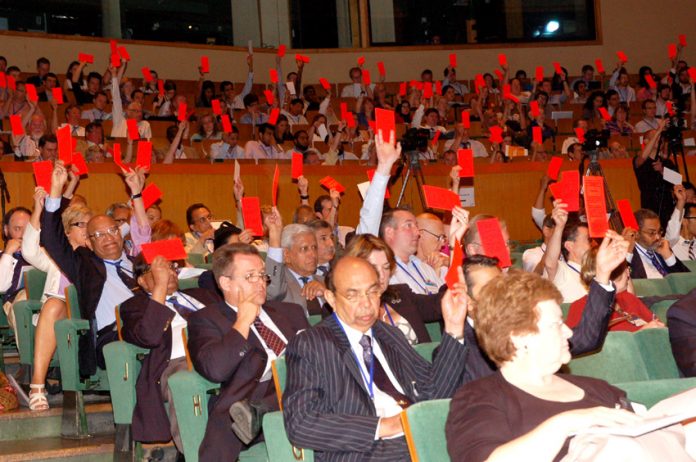DOCTORS at the British Medical Association’s Annual Representative Meeting in Cardiff yesterday passionately opposed the privatisation of the NHS.
The first motion, Motion 20, opposed ‘market-based policies in NHS health care provision’.
The motion stated that such policies are ‘not based on sufficient evidence that will improve the quality of care’ and adds that they are ‘potentially detrimental to medical training and professionalism’ and ‘may undermine the social contract between doctors and patients and reduce public trust in doctors’, and therefore ‘should be abandoned’.
Dr Adam Forman, from City and Hackney Division, moving the motion on behalf of the Agenda Committee, said: ‘The NHS is based on universal provision of health care and on the basis of need.’
He said that research showed that the market meant ‘higher costs and excluding a number of patients’.
He insisted that ‘increased efficiency and cost-effectiveness should not be a justification for marketisation’.
He warned: ‘There’s no responsibility for private providers to train new doctors.’
He stressed: ‘The market is to extract profit and it undermines the trust in doctors.’
He concluded: ‘Sadly, the Health and Social Care Bill, in relation to the market, has not fundamentally changed.’
He urged doctors not to allow the market into the NHS.
Dr Anthony Lynch said: ‘Private enterprise . . . could be given total control of the NHS.’
He stressed: ‘The market is not ideologically-driven, it has profit as its top and bottom lines.’
He concluded: ‘Support the motion in all its parts.’
Dr George Rae told the meeting: ‘We know any market leads to competition.
‘Any market has no room for equality and equal needs.’
He added: ‘Across the world competition results in poorer outcomes and escalating costs.’
He concluded: ‘The market policies should be abandoned.’
The motion was passed overwhelmingly, with just one or two against, on the recommendation of BMA chairman Hamish Meldrum.
The meeting went on to vote overwhelmingly for Motion 104 on commissioning that opposes ‘the privatisation and fragmentation of the NHS into a multitude of competing providers, with the potential to destabilise pivotal hospital services and insists that commissioning bodies should be required to use local NHS services as their preferred provider, unless the local NHS services cannot provide the services or capacity required.’
Mover, Anthea Mowat, told the meeting: ‘The current system of targets does not promote collaboration.’
She added: ‘There is little evidence that increased commercialisation and competition improve care.’
She warned: ‘Enforcing competition could prevent a commissioning body from choosing the best provider.’
Dr Anders Linder warned: ‘The private providers could suck out the blood of local NHS services.’
He added: ‘There is a suggestion that all non-emergencies be outsourced to other providers.’
He further warned: ‘The commissioning consortium is not even allowed to choose the local hospital.’
Dr Mark Temple opposed Clause Two of the motion, which calls for ‘the development of a payment system to incentivise collaboration between health care providers to deliver health outcome to patients.’
He warned: ‘If you have payment incentives it is a market.
‘Let’s have collaboration and not a market.’
BMA chairman Hamish Meldrum said: ‘I share your thoughts about Clause Two’ and recommended it be taken as a reference back.
The mover Anthea Mowat accepted Clause Two be referred back to the BMA General Council and the motion was passed overwhelmingly with this reference.
The meeting then went on to pass Motions 131 and 133 opposing spending cuts.
NEWS LINE – ALL TRADES UNIONS ALLIANCE
FRINGE MEETING
Tuesday at 6pm
The Royal Hotel,
88, St Mary’s St,
Cardiff
